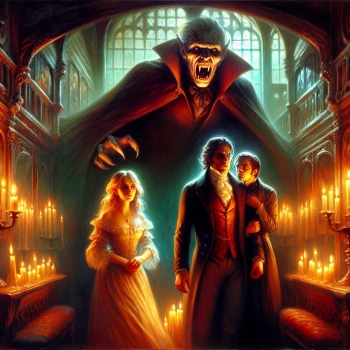
Bram Stoker
Bram Stoker, the Victorian-era Irish author known primarily for his Gothic masterpiece Dracula, profoundly influenced horror fiction and popular culture through his exploration of psychological conflict and societal critique.
Full Name: Bram Stoker
Born: Family Residence, Dublin, Ireland on November 8th, 1847
Died: Bloomsbury, London, United Kingdom on April 20th, 1912
Notable Works
Bram Stoker is best remembered for his masterpiece, "Dracula," a seminal work in Gothic literature that continues to captivate readers over a century after its publication. In this iconic novel, Stoker deftly blends horror, suspense, and supernatural elements, creating a chilling tale that explores enduring themes such as good versus evil, the nature of fear, and the struggle between life and death. Central to the novel's lasting appeal are unforgettable characters such as the sinister and charismatic Count Dracula, the steadfast Jonathan Harker, the resourceful Mina Harker, and the wise and determined Professor Abraham Van Helsing.
Another notable work by Stoker is "The Man," a gripping exploration of human nature and moral conflict that demonstrates his versatility and keen psychological insight. Across these influential works, Stoker consistently delves into profound questions about humanity, morality, and the allure of the unknown, securing his place as a literary figure whose creations remain timeless and influential.
Books by Bram Stoker
Overview & Analysis
Bram Stoker was an Irish author whose literary legacy is anchored by his iconic Gothic novel, Dracula. Born and raised during the transformative Victorian era, Stoker's writing vividly captures the period's tensions between scientific rationalism and traditional beliefs, exploring profound psychological conflicts and internal moral evolution through richly developed characters. His most famous work, Dracula, introduces enduring figures such as Count Dracula, Jonathan Harker, Mina Harker, and Professor Abraham Van Helsing, weaving a deeply symbolic narrative that critiques authoritarian governance, unchecked scientific ambition, and restrictive societal norms. Stoker's adept use of allegory and symbolism allows his narratives to serve as incisive commentaries on contemporary morality, emotional honesty, and personal integrity. The haunting imagery and compelling storytelling of Dracula have not only defined the vampire genre but have also profoundly influenced horror fiction and popular culture, cementing Stoker's lasting impact on literature and media well beyond his time.
Back to TopInfluences & Worldview
Bram Stoker's worldview was deeply shaped by the rich complexities and contradictions of the Victorian era. Living during a time of profound societal transformation, marked by industrial progress, scientific rationalism, and stark social inequalities, Stoker critically examined the fabric of contemporary morality and cultural norms. His writing reveals a keen philosophical curiosity, exploring profound psychological conflicts and internal moral evolution through vivid, character-driven narratives. Stoker was particularly cautious of unchecked scientific ambition, a reflection of his era's rapid embrace of technological advancement and its potential ethical consequences. Through extensive use of symbolism and allegory, he critiqued not only authoritarian governance but also the restrictive class structures and conservative social conventions of his time. Advocating for individual moral judgment over social conformity, Stoker sought to highlight the importance of personal integrity, loyalty, and emotional honesty amidst the pressures of a rapidly modernizing world.
Relevant Historical Events
- Rise of Scientific Rationalism (1700 – 1900): An intellectual movement emphasizing reason, scientific method, and empirical evidence as the primary sources of knowledge, challenging traditional religious and superstitious beliefs.
- Industrial Revolution (UK) (1760 – 1870): A time of rapid industrial, economic, and social change that restructured daily life and redefined childhood in Victorian England.
- The Victorian Era (1837 – 1901): The Victorian era was a period of significant change in the United Kingdom, marked by industrial, cultural, political, scientific, and military change within the United Kingdom, and was marked by a great expansion of the British Empire.
- Jack the Ripper Murders (1888): A series of brutal murders in London's East End committed by an unidentified serial killer, known as Jack the Ripper, which resulted in widespread fear, sensational media coverage, and highlighted social inequalities in Victorian society.
Notable Characters
Bram Stoker is renowned for crafting compelling characters that embody the fears and anxieties of the Victorian era. Central to his literary legacy is Count Dracula, the enigmatic and sinister vampire from his iconic novel "Dracula." Dracula symbolizes the allure of forbidden desires and the dread of the unknown, illustrating Stoker's fascination with themes of immortality, temptation, and the struggle between good and evil. Another pivotal figure, Jonathan Harker, represents rationality and Victorian propriety threatened by dark supernatural forces. Through Harker's experiences, Stoker explores humanity's vulnerability when confronted with inexplicable phenomena. Professor Abraham Van Helsing further exemplifies Stoker's interest in scientific rationalism, as he blends medical knowledge with folklore to combat vampirism, reflecting the era's tension between emerging scientific thought and traditional beliefs. Overall, Stoker's characters frequently grapple with internal and external conflicts arising from societal anxieties, scientific advancements, and moral ambiguity, vividly encapsulating the complex transition between tradition and modernity that defined his historical context.
Back to TopThemes of Focus
Bram Stoker consistently explores themes of the supernatural and the struggle between good and evil, most prominently exemplified in his iconic novel, Dracula. Through the embodiment of vampiric lore, he delves into humanity's innate fear of the unknown and the confrontation between rationality and superstition. His narratives often reflect the Victorian era's tension between traditional beliefs and the rise of scientific rationalism, highlighting society's anxieties around rapidly changing intellectual landscapes.
Additionally, Stoker frequently addresses themes of gender roles and sexuality, subtly critiquing Victorian society's rigid norms and repression. Through characters who navigate complex moral and social dynamics, he examines the implications of desire and the subversion of established conventions. These secondary themes reinforce his exploration of duality—between control and chaos, purity and corruption—and reflect broader cultural anxieties heightened by historical events like the sensational Jack the Ripper murders, which amplified societal fears concerning vulnerability, morality, and the hidden dangers lurking beneath civilized facades.
Back to TopLegacy & Impact
Bram Stoker's literary legacy continues to resonate profoundly within both literature and popular culture. His celebrated novel, Dracula, has left an indelible mark, essentially defining the modern vampire genre and influencing countless adaptations in film, theatre, television, and literature. Through this enduring narrative, Stoker explored complex themes such as the dangers of unchecked scientific ambition, psychological conflict, and the tension between individual morality and societal conformity, all of which remain profoundly relevant today.
The novel's central character, Count Dracula, has become a cultural icon symbolizing deeper societal anxieties surrounding invasion, otherness, and moral ambiguity. Scholars frequently analyze Stoker's works within the contexts of Victorian-era anxieties, particularly regarding sexual repression, colonialism, and industrialization. In educational settings, Dracula is widely studied not only as a classic of gothic literature but also as a historical commentary reflective of its time.
While Stoker himself did not overtly engage in political controversies, interpretations of his works have evolved over time, sparking discussions on gender roles, power dynamics, and historical prejudices. Today, his legacy persists robustly, influencing diverse fields from literary scholarship to popular media, demonstrating his lasting impact on literature and society.
Back to TopConclusion
Bram Stoker's literary contributions continue to captivate contemporary readers, resonating deeply with modern concerns about identity, morality, and the ethical implications of scientific ambition. His distinctive worldview—marked by a profound exploration of psychological conflict, individual integrity, and skepticism towards societal conventions—has profoundly influenced literary traditions, particularly within gothic fiction and psychological narratives. By masterfully employing symbolism and allegory to critique authoritarianism, class structures, and unchecked progress, Stoker laid the groundwork for generations of writers to interrogate complex societal issues through nuanced storytelling.
Today, readers remain drawn to Stoker's work not only for its thrilling and atmospheric narratives but also for its enduring insights into human nature and societal transformation. Engaging with his stories invites a reflection on contemporary ethical dilemmas, reinforces the value of emotional honesty, and encourages individual moral judgment amidst societal pressures, thus ensuring Stoker's continued relevance and significance in modern literature.
Back to Top
